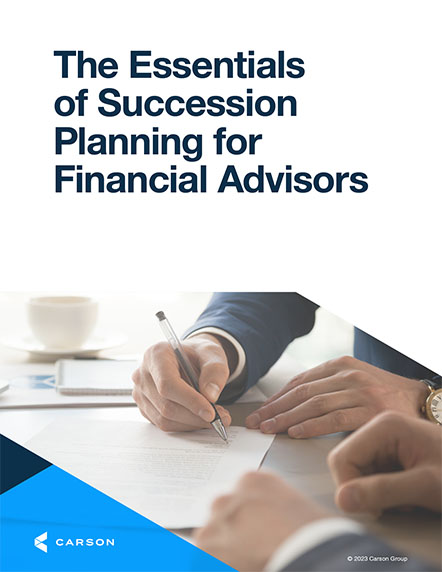The RIA landscape is enjoying historic valuations as bidding on these firms by other RIAs, broker-dealers, banks and private equity firms drives up prices.
The interest is understandable. McKinsey reports RIAs have achieved 12% annual growth in assets since 2016, making them the fastest-growing category in the U.S. wealth management market.
At Carson Group, we are highly active in the mergers and acquisitions (M&A) arena as we continue to grow our partner network. This gives us a window into what’s playing out across the country. Over the past five years, we have seen valuations more than double in certain situations.
You’ve spent decades building your financial advisory business. Now that it’s time to sell, it’s critical to understand its worth. Use Carson Group’s Valuation Calculator and take the first step toward selling your financial advisory business.
While prices remain at historic highs, many financial advisors are getting to the age when they are starting to think about retirement and what to do with the business they’ve built up over the last 30-plus years.
According to research from Cerulli Associates, 37% of financial advisors are expected to retire within the next 10 years. These advisors collectively control $10.4 trillion, which is 40% of total industry assets.
The timing for selling your financial advisory business could not be better. It’s a seller’s market. But the deal isn’t just about the numbers. It’s about finding the right buyer, taking care of your people and your clients, and creating the future you want to have.
Here are the key steps to help you get started.
Six Steps to Selling Your Financial Advisory Business
- Be Clear About Your Motivation
- Value Your Business
- Find and Evaluate Buyers
- Prepare for the Sale
- Build Your M&A Team
- Communicate the Sale with Your Clients
Be Clear About Your Motivation
There are several questions to ask yourself that will help set the stage for a successful sale. Specifically:
- Why are you selling your financial advisory business?
- What would you like to get out of the sale?
- Are you hoping to sell to second-generation advisors in your office if that’s possible, or are you looking to sell it to a larger RIA firm?
- Do you want to stay another five or 10 years, or do you want to ride off into the sunset?
Your purpose behind selling your financial advisory business will determine how you approach the sale, requirements on the part of the buyer and, ultimately, how you structure the deal.
Value Your Business
Generally, in the financial advisory industry, firms are valued based on multiples of earnings before interest, taxes, depreciation and amortization (EBITDA). This varies based on the characteristics of the firm.
From a numbers’ perspective, size is a key factor in arriving at a price. For example, the greater your assets under management (AUM), the higher the multiples. A firm with $1 billion in AUM will trade at a significantly higher valuation that a firm with $50 million in AUM. Other key factors include the quality of the team, the firm’s historical organic growth rate, the average client size, the amount of liabilities/debt on the balance sheet and the firm’s profit margins.
You can get a feel for what you’re multiple looks like using our firm valuation calculator, which factors in fee-based assets, size of your team and number of clients.
Client relationships play an equally integral role in the valuation process. In addition to the total number of clients the firm has and the revenue they bring, buyers will conduct due diligence to assess the strength of client relationships. Long-term clients and low churn indicate healthy client relationships. Buyers may structure the deal to help ensure these relationships continue after the sale by requiring a portion of the purchase price to be paid in the form of retention payments over a period of time.
Determining a valuation can seem like more art than science. It may help to speak with peers in your network who have gone through a sale. You may also want to tap into the expertise of an investment bank or other firm that specializes in conducting formal evaluations for financial advisors.
At Carson, we pride ourselves in helping our partner firms pursue their goals. This could include assisting in transitioning ownership to second- or third-generation advisors within an office. Often, that assistance comes in the form of a valuation, deal structure and/or securing financing. In addition, we are flexible in our approach to acquisitions.
In certain circumstances, it may make sense to monetize a percentage of your financial advisory business today and then sell the remaining stake down the road and reap the benefit of that growth over time. On numerous occasions, we have structured the initial investment in a firm as a minority stake, with the goal of Carson owning 100% of the firm at some point in the future.
Find and Evaluate Buyers
Your motivation for selling will guide your search for the right buyer.
The search may start organically with second-generation advisors within your firm. Or you may consider reaching out to peers in your professional and personal networks, broker-dealers and larger RIAs and attending industry events to get the word out. Some investment bankers specialize in the wealth management space and can actively market your business to potential buyers within their own networks.
As you begin your search for a potential buyer, be sure to do your due diligence. Getting answers to your questions will help ensure you align culturally. Do they have the financial resources to make the purchase? Does the potential buyer have the capacity to effectively serve your clients? Do they offer similar products and services? Do they share your values and investment philosophy? How does the potential buyer manage their people and their client relationships? Will you and your advisors be able to work well and effectively with the buyer and their team?
At Carson, our focus is financial planning. When we buy wealth management firms, we bring them into our RIA and try to maintain the acquired office’s autonomy. We provide a full suite of products, services and training to help you succeed.
Prepare for the Sale
There are a few factors that will help the sale process go smoothly and help you maximize the value of your firm. Having good data is one of these. Make sure you are able to respond to potential buyers’ queries with accurate information and in a timely manner. This includes having up-to-date financial statements, records of recent and historical AUM and performance, growth trends, customer profiles and more.
Have the data ready before you start connecting with buyers. How long it takes to pull this information together will depend on how organized your office has been in its record-keeping.
If, as the seller, you aren’t prepared with the information a buyer needs or you provide inaccurate or incomplete information, the buyer may view this as an indication that the office is not well run, putting your chances of getting the highest valuation at risk.
When Carson Group receives an inquiry from an advisor thinking about selling, we request a short list of information. We will typically respond with a proposal (known as a letter of intent, or “LOI”) within a week or so of receiving the requested information back from the seller. That LOI will spell out all the key terms of a potential transaction. From that point, if both parties agree, we’re off to the races.
In our experience, we can close a transaction within 60 to 90 days of signing the LOI. However, the timing is highly dependent on several factors, including how motivated and organized the seller is, what kind of consents might be required and how heavily negotiated the deal documents are.
Build Your M&A Team
An effective M&A team will help prepare and guide you through the sales process and transaction.
In all cases, be sure to work with people and firms who have a deep understanding of the wealth management industry and are experienced at conducting mergers and acquisitions. This includes an M&A lawyer, CPA or bookkeeper who can help prepare the financial statements, as well as a tax specialist. Working with an investment banker can also be beneficial.
While sellers often think that they may save money by using their general business advisors, who often bill at lower rates per hour than specialists, in our experience, these generalists often end up costing more than the specialists, as the generalists end up requiring significantly more hours to do the same work or potentially miss important items in the purchase documents that end up costing the seller either at that time or down the road.
Communicate the Sale with Your Clients
While you may have been engaged in the sales process for months, it’s important to wait until you have a high degree of certainty the deal will close before you tell your clients. If you tell clients too early and the deal falls through, this creates uncertainty for your clients and may raise red flags for other potential bidders.
Once you are confident, be open and transparent with your clients. Explain why you chose to sell and communicate clearly about what clients can expect, including any impacts to their current investments, the products and services that will be available to them with the buyer, changes in pricing and the timing of when changes will take effect.
Err on the side of over-communicating. The more you can be precise and clear about how the sale will impact clients, the more confident they will feel. How you communicate will depend on the number of clients you have and the nature of your relationships. You may want to start with a phone call or in-person meeting and then follow up with written materials. It may make sense to organize a social event and bring clients together to explain the sale, next steps and answer questions. With every communication, let them know you appreciate their business.
The Bottom Line
Selling your financial advisory business is a life-changing decision and often the culmination of a lifetime of hard work. A clear understanding of why you’re selling and the value you’ve built will help you secure your legacy for you and your family.




